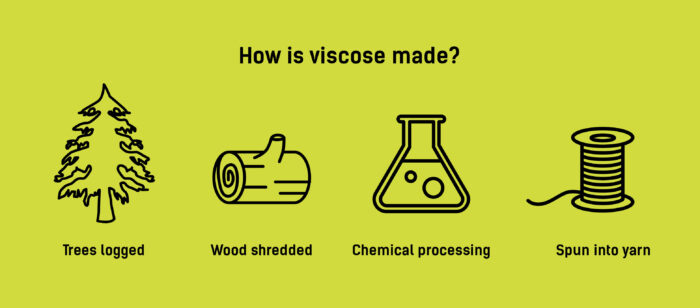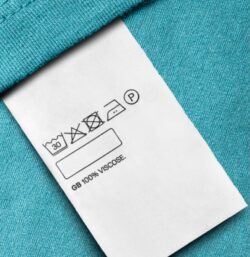Dirty Fashion Disrupted: Are brands improving their viscose supply chain?
A new report by Changing Markets Foundation, ‘Dirty Fashion Disrupted’, reveals that while some fashion brands and leading viscose producers are making progress to clean up dirty viscose manufacturing, the majority of brands simply continue to talk about sustainability with no evidence of action.
WHAT IS VISCOSE?
In simple terms, viscose is a cellulosic fibre which is made from wood pulp. This means that the material has a major impact on deforestation and requires a strenuous, and often heavily polluting, chemical process to turn the raw material (wood) into textiles for clothing. It’s this chemical production process that Changing Markets is trying to clean up.

Viscose is the third most commonly used fibre in the world and it has the potential to be a sustainable alternative to oil-based synthetics. Yet, previous Dirty Fashion investigations found clear evidence of viscose producers dumping untreated wastewater, contaminating waterways and ecosystems, and causing severe health impacts to local communities.
A toxic and endocrine-disrupting chemical, carbon disulphide (CS2), used in the viscose manufacturing process has been linked to serious health conditions, most notoriously as a cause of mental illness in factory workers but also a wide range of other conditions ranging from kidney disease to heart attacks and strokes.
DIRTY FASHION DISRUPTED
‘Dirty Fashion Disrupted’ assesses where global clothing companies and viscose producers stand in the transition towards responsible viscose. Through detailed scrutiny of 91 brands’ and retailers’ transparency and sourcing policies, and producers’ responsible production plans, the report examines the progress to date and gaps in existing commitments and pledges.
In August 2019, the Changing Markets Foundation – along with Fashion Revolution, Ethical Consumer, the Clean Clothes Campaign and WeMove.eu – reached out to over 90 global clothing brands and retailers, asking them for their most recent information on how much viscose they use, the details of any policies they have to address the environmental impacts of their viscose supply chain, the names and factories of their viscose suppliers, any plans to disclose these suppliers publicly in the future, and inviting them to commit to the Roadmap towards responsible viscose and modal fibre manufacturing.

SOME IMPROVEMENTS…
Many brands have shown a marked increase in transparency on their viscose supply chain. On their websites, four of the brands who have signed onto the campaign, Esprit, Tesco, M&S and ASOS, now publicly list the companies – down to the factory names – that provide them with viscose fibre. The remaining signatories (apart from Inditex), as well as several other brands, have disclosed the name of at least several of their viscose suppliers on their websites.
Orsola de Castro, Founder and Creative Director of Fashion Revolution commented:
“Transparency is visibility. We want to see the fashion industry, respect its producers and understand its processes. We want a clear, uninterrupted vision from origin to disposal to foster dignity, empowerment and justice for the people who make our clothes and to protect the environment we all share.”
STILL NOT ENOUGH ACTION…
The vast majority of brands are still lagging a long way behind the frontrunners on transparency. You can see which brands are taking steps towards more responsible viscose here: http://dirtyfashion.info/
Ten major high street brands and retailers have committed to take action on responsible viscose supply. However, luxury brands, including Prada, Dolce & Gabbana and Dior and low-cost retailers such as Walmart, Matalan and Boohoo, are failing to take action on polluting supply chains, devastating ecosystems and causing severe health impacts in local communities in India, China and Indonesia. It’s clear that the commonality among the laggards isn’t price point, but willingness to take fashion’s footprint seriously.
More than 25% of the brands investigated have no viscose policy in place, and many of these lack any environmental policy. Still, the Changing Markets has seen an increase in the number of brands responding to their questions and engaging with the campaign. For a full list of their findings, go here.
THE ROADMAP
In 2018, Changing Markets launched a Roadmap towards responsible viscose and modal fibre manufacturing to address the environmental and social problems in its manufacturing and provide a blueprint for responsible production for brands.
Ten major brands and retailers – Inditex, ASOS, H&M, Tesco, Marks & Spencer (M&S), Esprit, C&A, Next, New Look and Morrisons – have now made a public pledge to integrate its requirements into their sustainability policies. These brands are also expected to engage with their suppliers and use their leverage to drive towards more responsible viscose production.
Urska Trunk, Campaigns Adviser, Changing Markets Foundation commented:
“With increasing awareness of the environmental and social impacts of the fashion industry, people expect clothing companies to take responsibility for their supply chains. Brands and retailers can no longer turn a blind eye to this. They need to rise to the challenge and open their supply chains up to external scrutiny to put the industry on a more sustainable footing.”
WHAT CAN WE DO?
As citizens and consumers, we must use our voices to demand that fashion brands source materials in a transparent and responsible manner. It is unacceptable that over a quarter of the surveyed brands have turned a blind eye on viscose production that poisons people and contaminates waterways. Let’s ask #WhoMadeMyClothes? because we know that transparency is the first step in achieving a clean fashion industry that is safe for the wearers and the workers.
Tweet brands using the hashtag #dirtyfashion and ask them to be more transparent and move towards more responsible viscose here. Sign the petition to demand more responsible viscose here.








